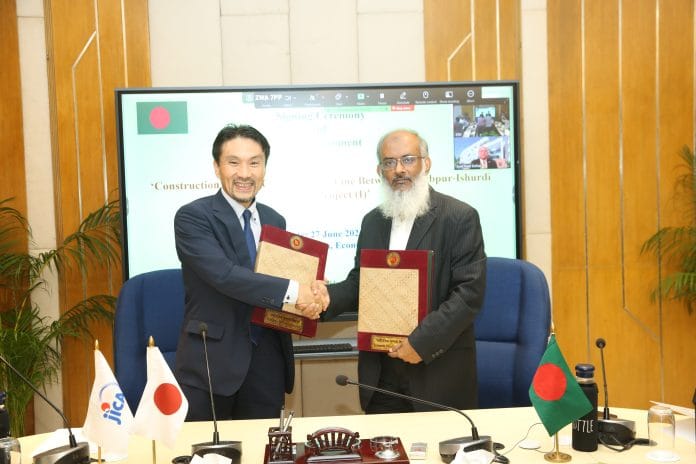An agreement was signed on Friday between Bangladesh and Japan for nearly $630 million loans for a key railway line upgradation project under the 2nd batch of the 46th Japanese ODA Loan Package.
Md Shahriar Kader Siddiky, secretary, Economic Relations Division, while ICHIGUCHI Tomohide, chief representative of the JICA Office in Bangladesh, signed the loan agreement on behalf of their respective sides at a function at the NEC-2 conference room in the capital, says a release.
On May 30 this year, during the Chief Advisor’s visit to Japan, the ‘Exchange of Notes’ for the loan of this project was signed in Tokyo, Japan.
“Construction of Dual Gauge Double Line Between Joydebpur-Ishurdi Section Project (I)” has been undertaken with the aim of improving the country’s communication system by enhancing the capacity of the existing railway track through double tracking.
The project will include the construction of a 162 km dual gauge main line, 25 km loop and siding lines, 11 km reconstruction of existing tracks, construction of 3 new stations, and other associated works.
The government of Japan will provide funding for the project in different phases. Previously, a loan agreement of JPY 4,228 million (approximately USD 32 million) was signed with the government of Japan for the engineering services of the project.
For this first tranche, the interest rate for the loan is 2.00% for construction works, 0.65% for consultancy services, and a Front-End Fee (at a time) of 0.20%. Repayment period of this loan will be 30 years which includes 10 years grace period.
Japan is the largest bilateral development partner of Bangladesh: Japan has been providing continuous support for the socio-economic development of Bangladesh since our independence.
In line with the Bangladesh government’s priorities for achieving economic growth, the Japanese government has so far committed USD 33.62 billion loan and grant assistance for infrastructure development in different sectors like communications, power and energy, agriculture, education, health and family welfare, water supply and sanitation, rural development, environmental development, and human resource development.

